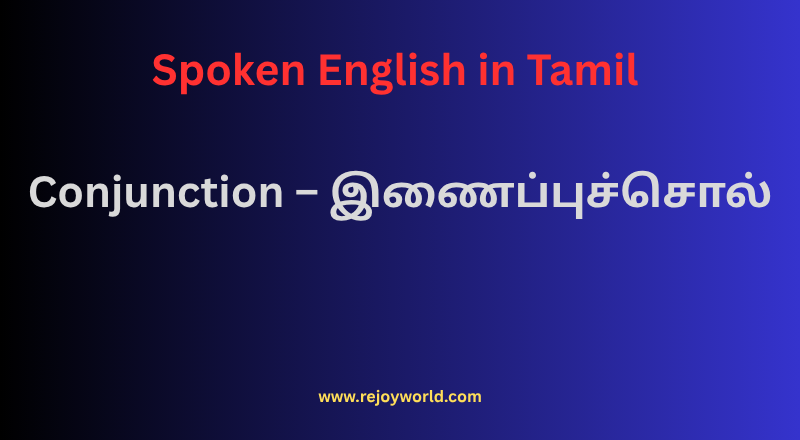Conjunction – இணைப்புச் சொல்
Conjunctions are words that join words, phrases, or sentences.
இரண்டு அல்லது இரண்டிற்கு மேற்பட்ட சொற்கள் மற்றும் வாக்கியங்கள் இடையே இணைப்பை ஏற்படுத்தும் சொற்கள் இணைப்புச்சொற்களாகும். இணைப்புச்சொல் என்றும் கூறலாம்.
எடுத்துக்காட்டாக:
I like tea and coffee
நான் டீவும் மற்றும் காபியும் விரும்புகிறேன்.
He is poor but honest
அவன் ஏழை, ஆனால் நேர்மையானவன்.
He and I are friends.
அவன் மற்றும் நான் நண்பர்கள்.
She is tired but happy.
அவள் சோர்வாக இருக்கிறாள் ஆனால் சந்தோசமாக உள்ளது.
You can have tea or coffee.
நீங்கள் டீ அல்லது காபி குடிக்கலாம்.
I stayed home because it rained.
மழை பெய்ததால் நான் வீட்டே இருந்தேன்.
Although he was ill, he went to work.
அவன் நோயுடன் இருந்தாலும், வேலைக்கு சென்றான்.
I ate bread and butter.
நான் உரொட்டியும் வெண்ணையும் சாப்பிட்டேன்.
Ram and Hari went to school.
ராமும் ஹரியும் பள்ளிக்குச் சென்றார்கள்.
Types of Conjunctions
-
Coordinating Conjunctions (இணைச்சேர்மொழிகள்)
-
Subordinating Conjunctions (சார்புச் சேர்மொழிகள்)
-
Correlative Conjunctions (இரட்டைப் சேர்மொழிகள்)
-
Conjunctive Adverbs (இணைப்புக் குறிக்கும் வினையுரிச்சொற்கள்)
1. Coordinating Conjunctions (இணைச்சேர்மொழிகள்)
இவை இரண்டு சம நிலை கொண்ட சொற்கள் அல்லது வாக்கியங்களை இணைக்கின்றன.
Seven common ones can be remembered by the rule FANBOYS:
-
F – For (ஏனெனில்)
-
A – And (மற்றும்)
-
N – Nor (அல்ல)
-
B – But (ஆனால்)
-
O – Or (அல்லது)
-
Y – Yet (இன்னும் / இருந்தாலும்)
-
S – So (ஆகவே)
Examples with Tamil:
-
She was tired, but she kept working.
அவள் சோர்வாக இருந்தாள், ஆனால் வேலை தொடர்ந்தாள். -
Do you want tea or coffee?
உங்களுக்கு டீ அல்லது காபி வேண்டுமா? -
He was hungry, so he ate quickly.
அவனுக்கு பசித்தது, ஆகவே அவன் சீக்கிரம் சாப்பிட்டான்.
2. Subordinating Conjunctions (சார்புச் சேர்மொழிகள்)
These join a dependent clause (சார்ந்த வாக்கியம்) with an independent clause (சுய வாக்கியம்).
Common subordinating conjunctions:
because, since, although, though, if, unless, when, while, after, before, till, until.
Examples with Tamil:
-
I stayed at home because it was raining.
மழை பெய்ததால், நான் வீட்டிலேயே இருந்தேன். -
You can’t succeed unless you work hard.
நீ கடுமையாக உழைக்காவிட்டால், நீ வெற்றி பெற முடியாது. -
I will call you when I reach Chennai.
நான் சென்னை வந்தவுடன் உனக்கு அழைப்பேன்.
3. Correlative Conjunctions (இரட்டைப் சேர்மொழிகள்)
இவை இரட்டைச் சொற்களாக வந்து வாக்கியங்களை இணைக்கும்.
Examples: both… and, either… or, neither… nor, not only… but also, whether… or.
Examples with Tamil:
-
She is interested in both music and dance.
அவளுக்கு இசையிலும் மற்றும் நடனத்திலும் ஆர்வம் உள்ளது. -
You can have either coffee or juice.
உங்களுக்கு அல்லது காபி அல்லது ஜூஸ் கிடைக்கும். -
He is not only rich but also kind.
அவன் பணக்காரன் மட்டும் அல்ல, நல்ல மனசுக்காரன் கூட.
4. Conjunctive Adverbs
கண்டிப்பாக formal writing’இல் இது அதிகம் வரும். ஆனால் பேசும் ஆங்கிலத்திலும் casual-ஆக use செய்வோம்.
Examples: however (எப்படியாயினும்), therefore (ஆகவே), besides (மேலும்), otherwise (இல்லையெனில்), instead (அதற்கு பதிலாக).
Examples with Tamil:
-
He was ill. However, he went to work.
அவன் உடம்பு சரியில்லை. எப்படியாயினும், வேலைக்கு போனான். -
You must work hard; otherwise you will fail.
நீ கடுமையாக உழைக்க வேண்டும்; இல்லையெனில் தோல்வியடைவாய்.
Conversations with “and” (மற்றும்)
-
I bought apples and bananas.
நான் ஆப்பிள் மற்றும் வாழைப்பழம் வாங்கினேன். -
Spoken Style:
-
“I bought apples and bananas.”
-
Tamil: “ஆப்பிள், வாழைப்பழம் வாங்கினேன்.”
-
With “but” (ஆனால்)
-
He is smart but lazy.
அவன் புத்திசாலி, ஆனால் சோம்பேறி. -
Spoken Short Form:
-
“He’s smart, but lazy.”
-
Or casual speech: “Smart, but lazy.”
-
With “because” (ஏனெனில்)
-
I didn’t go to school because I was sick.
நான் உடம்பு சரியில்லாததால் பள்ளிக்கு போகவில்லை. -
Spoken Version:
-
“Didn’t go, ’cause I was sick.”
-
Tamil: “போல, உடம்பு சரியில்லை.”
-
With “so” (ஆகவே)
-
It rained heavily, so we stayed at home.
கனமழை பெய்தது, ஆகவே நாம வீட்டிலேயே இருந்தோம். -
Spoken Informal:
-
“It rained, so we stayed in.”
-
With “if” (என்றால்)
-
If you study well, you will pass.
நீ நன்றாக படித்தால், தேர்ச்சி பெறுவாய். -
Spoken:
-
“You study, you’ll pass.”
-
With “when” (எப்போது)
-
Call me when you reach.
வந்து சேர்ந்தவுடன் என்னைக் கூப்பிடு. -
Spoken Informal:
-
“Reach pannina odane call pannunga.”
-
With “although / though” (இருந்தாலும்)
-
Although he is young, he is wise.
அவன் இளமையானவன் இருந்தாலும், அறிவாளி. -
Spoken Short Form:
-
“He’s young, though wise.
-
Spoken English Patterns (Model Sentences)
| Conjunction | Model Sentence | Tamil Meaning |
|---|---|---|
| and | He plays cricket and football. | அவன் கிரிக்கெட் மற்றும் கால்பந்து விளையாடுகிறான். |
| but | She is rich but unhappy. | அவள் பணக்காரி, ஆனால் மகிழ்ச்சியில்லாதவள். |
| or | Do you want tea or coffee? | உனக்கு டீ அல்லது காபி வேண்டுமா? |
| so | It’s late, so let’s go. | நேரம் ஆகிறது, ஆகவே போகலாம். |
| because | I stayed home because I was sick. | நான் ஏனெனில் உடம்பு சரியில்லாததால் வீடிலிருந்தேன். |
| if | I will help you if you ask. | நீ கேட்டால் உனக்கு உதவுவேன். |
| when | Come when you are free. | நீ காலியாக இருந்தால் வா. |
| although | He worked hard, although he was tired. | சோர்வாக இருந்தாலும் கடுமையாக உழைத்தான். |
| either…or | You can go either today or tomorrow. | நீ இன்றோ அல்லது நாளையோ போகலாம். |
| not only…but also | She is not only smart but also kind. | அவள் புத்திசாலிதான் இல்லை, நல்ல மனசுக்காரியும் ஆவாள். |
